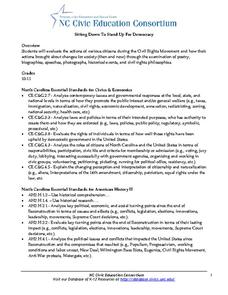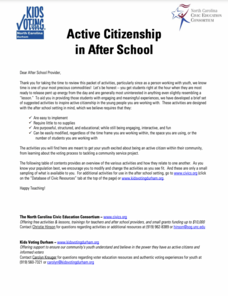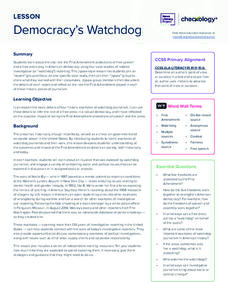University of North Carolina
Sitting Down To Stand Up For Democracy
Boycotts and bus rides, sit-ins and speeches. The focus of this amazing resource is on those people who were willing to put themselves at risk to take a stand for their belief in equal rights for all. A must-have for your curriculum...
Core Knowledge Foundation
Early Presidents and Social Reformers
A unit by Core Knowledge begins with information about early United States presidents. Pupils then explore social reformers such as Sojourner Truth and Frederick Douglas, abolitionism, women's rights, and more. Participants listen and...
Carolina K-12
Doing Democracy
How do you explain democracy to a middle school classroom? A social studies resource breaks elections and the democratic process down for your class. Discussion questions, worksheets, activities that build critical thinking skills, and a...
Carolina K-12
How Do I Pre-Register and Vote in North Carolina?
Did you know that in some states your pupils can pre-register to vote? Teach the advantages to pre-registering and engage the classroom in an intriguing discussion about youth voting trends. Class members participates in a live polling...
Facing History and Ourselves
The Challenge of Confirmation Bias
Confirmation bias makes it difficult to overcome our preconceived notions of others. That's the big idea in a lesson plan that teaches learners strategies to recognize and question their biases.
Facing History and Ourselves
Transcending Single Stories
The focus of the second lesson in the Standing Up for Democracy unit is on the power of assumptions based on a single experience or point of view. Class members begin by journaling about assumptions others make about their identity based...
Echoes & Reflections
Nazi Germany
The Holocaust was an evolution of anti-Semitism, scapegoating, and targeted violence against Jews with Nazi policies. A resource unpacks the escalation in violence, along with the erosion of democratic institutions, during the 1930s....
Facing History and Ourselves
Life for German Youth in the 1930s: Education, Propaganda, Conformity, and Obedience
The German youth faced an onslaught of propaganda when they went to school, thanks to the Nazi regime led by Hitler during World War II. Pupils relate their education experiences to German youth by analyzing primary source readings,...
University of Arkansas
Our Responsibilities
The fourth in a five-lesson unit examining human rights and personal responsibility asks class groups to investigate a current rights issue, and using the provided graphic organizer, summarize the issue, consider which rights are being...
Oakwood Publishing
Workshop 4: Constitutional Convention
How do new amendments become part of the US Constitution? AP government students explore, analyze, and use the US Constitution to develop a deep understanding of the interworkings of law and government while practicing synthesis and...
Annenberg Foundation
Electoral Politics
You won't just get a lesson when you click on this resource. As you click on the related resources located to the left of the screen, you'll find, a professional development video, teacher/student notes, lesson plan, and related...
Curated OER
The Glory That Was Greece
Today we are going Greek! Provide the class with a clear and well-organized overview of all things pertaining to ancient Greece. From early Greeks and Homer, to the Persian Wars and great philosophers, this slide show has it all. Review...
Curated OER
American Studies
Entitled American Studies, this small unit covers various topics related to the study of the United States. Learners warm up by creating a dictionary of democracy, then dive into three different lessons focused on government, famous...
Curated OER
Types of Government
Clear text, relevant images, and short facts about different types of government on each page will interest your students and keep them on task. After the 11 types of governance are summarized, there is a fun game; each of the 9 slides...
US House of Representatives
House History Comes Alive
How reliable is oral history? The resource uses the oral history website to help academics understand the pros and cons of using recollections to teach others. Scholars complete a worksheet, draft a letter to a representative, and...
Carolina K-12
Compulsory Voting
Should voting in the United States be compulsory? In 2004, fewer than 60 percent of eligible voters cast ballots in the American national elections. After reviewing arguments for and against compulsory voting, your young citizens will...
K20 LEARN
Ancient Philosophy: Greeks or Romans?
While often not recognized, the ideas of ancient Greek and Roman philosophers still echo today. Using a series of videos and graphic organizers, individuals explore how ancient Greeks and Romans have influenced current Western political...
Core Knowledge Foundation
Early Presidents and Social Reformers
An ebook by Core Knowledge features information about early United Stated presidents such as George Washington and Thomas Jefferson and social reformers such as Sojourner Truth and Frederick Douglas.
Anti-Defamation League
Bringing It Home
The "Bringing It Home" lesson asks scholars to investigate segregation and diversity in their school. They research, collect, and analyze local demographics. After reflecting on their personal experiences with cliques and social...
Anti-Defamation League
The Road to Brown
As part of the study of segregation in U.S. schools, scholars research and create a timeline of events that led to the historic Supreme Court case, Brown V. Board of Education. Groups research a topic or event that led to the decision,...
Carolina K-12
Active Citizenship in After School
Active citizenship is the bedrock of any great democracy. Continue the trend by teaching the next generation about voting rights and the functions of elections in society. The variety of activities in the resource includes a human...
Carolina K-12
The Electoral College
Is the Electoral College the best method of electing the president of the United States? Your young historians will write a persuasive essay discussing the historical perspective of the college, pros and cons, and a final argument...
A&E Television
Documenting Democracy: Lesson Plans on the United States Constitution
Balance and compromise. Class members come to understand the importance of these concepts as they investigate the concerns of the various stakeholders and how the format of the Constitution addressed these concerns.
News Literacy Project
Democracy’s Watchdog
As part of a study of the importance of the First Amendment, expert groups research different historic case studies of investigative reporting, and then the experts share their findings with jigsaw groups. The case studies include Nellie...

























